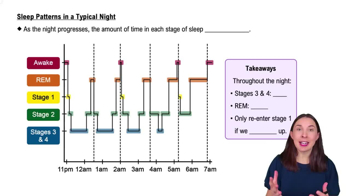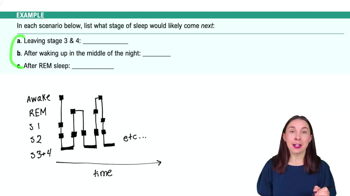Table of contents
- 1. Introduction to Psychology1h 43m
- 2. Psychology Research2h 20m
- 3. Biological Psychology2h 41m
- 4. Sensation and Perception28m
- 5. Consciousness and Sleep32m
- 6. Learning41m
- 7. Memory34m
- 8. Cognition37m
- 9. Emotion and Motivation35m
- 10. Developmental Psychology33m
- 11. Personality48m
- 12. Social Psychology41m
- 13. Stress and Health41m
- 14. Psychological Disorders44m
- 15. Treatment47m
5. Consciousness and Sleep
Sleep
Struggling with Psychology?
Join thousands of students who trust us to help them ace their exams!Watch the first videoMultiple Choice
A person has entered N3 sleep when delta waves account for _____ percent or more of brain wave activity.
A
5
B
20
C
75
D
90
 Verified step by step guidance
Verified step by step guidance1
Understand the stages of sleep: Sleep is divided into several stages, including NREM (Non-Rapid Eye Movement) and REM (Rapid Eye Movement) sleep. NREM sleep is further divided into stages N1, N2, and N3.
Identify the characteristics of N3 sleep: N3 sleep, also known as slow-wave sleep or deep sleep, is characterized by the presence of delta waves, which are high amplitude, low frequency brain waves.
Recognize the significance of delta waves: Delta waves are most prominent during N3 sleep and are associated with the deepest stages of sleep, where the body is in a state of restoration and recovery.
Determine the threshold for N3 sleep: N3 sleep is defined by the presence of delta waves accounting for a certain percentage of brain wave activity. This threshold is crucial for identifying when a person has entered this stage of sleep.
Apply the knowledge to the problem: Use the information about delta wave activity to determine the percentage required for a person to be considered in N3 sleep, which is when delta waves account for 20 percent or more of brain wave activity.

 3:25m
3:25mWatch next
Master Circadian Rhythms with a bite sized video explanation from Hannah Gordils
Start learningRelated Videos
Related Practice


































































































![Race, Genes and IQ Differences | Bret Weinstein [Mini Clip]](https://img.youtube.com/vi/IztL_m3pd70/mqdefault.jpg)



































































































